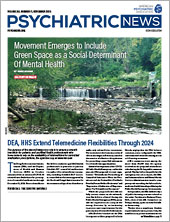In 1994, in Chicago, a group of Black women launched a movement focused on reproductive justice. These women recognized the necessity of supporting women’s right to have autonomy over their bodies and to affirm their reproductive rights. They defined reproductive justice as a human right to control their sexuality, gender, work, and reproduction.
On June 24, 2022, the Supreme Court overruled Roe v. Wade, ruling the Constitution does not confer a right to a medically induced abortion. It was a political decision with immediate direct and indirect consequences. The decision ironically was made two years after many loudly voiced their rights to have control over their bodies to object to “jabs,” referring to the COVID-19 vaccination. As physicians specializing in brain disorders with treatments that are often teratogenic, it is vital that psychiatric physicians educate ourselves and our patients about reproductive health.
This year, I twice had the opportunity to discuss this important topic alongside California Surgeon General Diana Ramos, M.D., an OB-GYN physician who is also a mental health advocate. Our first opportunity was in January when we discussed the legacy of Martin Luther King Jr., a 1966 recipient of Planned Parenthood’s Margaret Sanger Award in Human Rights, and the second was during the Bebe Campbell Moore National Minority Mental Health Awareness Month kickoff event in July, where Dr. Ramos and I discussed the need for collaboration and advocacy. On both occasions, we emphasized the benefits of collaboration and leading “head first,” in other words, to focus on scientific facts.
Here are just a few take-home points from my discussions with Dr. Ramos:
•
The Turnaway study found that electing to have an abortion does not harm the health and well-being of women but restricting access does.
•
Both psychiatrists and OB-GYN physicians may discontinue psychotropic medications during a pregnancy due to concerns about the fetus experiencing adverse effects but often do not consider the benefits to the mother’s health. This practice may contribute to maternal stress and increase risk of decompensation.
•
Some psychotropic medications are teratogenic.
•
Psychiatrists and primary care physicians, including OB-GYN physicians, play a vital role in educating women about birth control options (including abstinence) and side effects.
•
23% of pregnancy-related deaths up to one year postpartum are secondary to a mental disorder including suicide and overdose.
•
Regardless of socioeconomic status or education level, Black women have a four to six times greater risk of maternal mortality.
•
About 10% of fathers experience paternal perinatal depression; however, most perinatal mental health services solely focus on women.
•
Women are one of the fastest-growing cohorts in the U.S. carceral system. Among female state prisoners, two-thirds are mothers of a minor child. Parental incarceration is a recognized adverse childhood experience.
•
When adverse childhood effects are adequately addressed before age 18, 44% of youth with symptoms of depression improve.
•
Experts predict the United States will face reproductive health care deserts in the near future as physicians and medical trainees choose to work and train in areas where women have complete autonomy over their reproductive choices and the opportunity to be trained in all appropriate treatment options.
An African proverb says that if you educate a woman, you educate a nation. APA is dedicated to collaboration to improve mental health access. By increasing advocacy efforts focused on reproductive justice at the bedside, in the clinic, and beyond, psychiatric physicians have an opportunity to not only improve the mental health of individual women, but also the health of communities. ■


